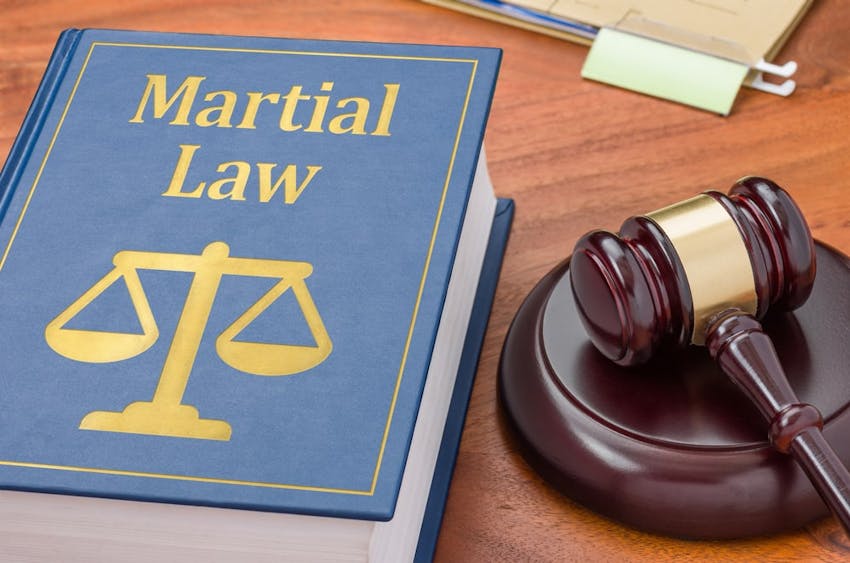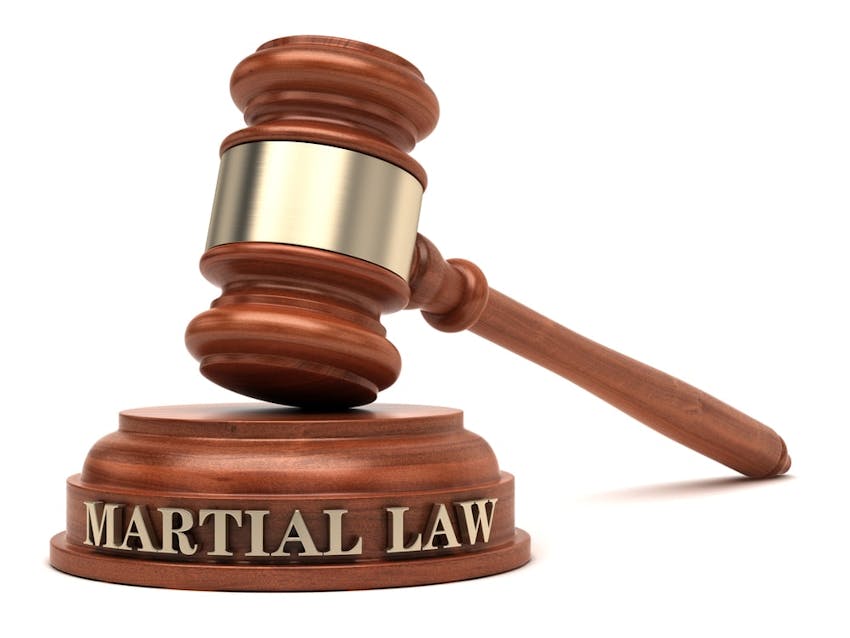Blog
What Is Martial Law?
3.13.2024
You may have heard of martial law but not what it entails. Martial law is when military authorities substitute the civil government. They are granted unlimited power to suspend the legal protections of their civilian rights.
You may have heard of martial law but not what it entails. Martial law is when military authorities substitute the civil government. They are granted unlimited power to suspend the legal protections of their civilian rights.
When martial law is declared, it’s usually in response to a crisis or imposed during an actual war or foreign invasion. During disasters or when civil unrest is present, it’s more common to declare an emergency rather than martial law.
If martial law is declared, it is a last resort. It can be difficult to suddenly have the rights granted by the government torn away from you. Actions you normally take may violate martial law declarations. This would mean you’d face consequences through the criminal justice system.
Very Law in Pittsburgh has provided this blog post on what martial law means to give you a greater understanding of your rights.

Who Can Declare Martial Law?
Martial law can have negative impacts on the country and every citizen within it. This is why it’s reserved for situations in which law and order are coming undone.
Declaring martial law is done to quell protests, civil unrest, or insurrections. Declaration of martial law may also occur during a time of war.
The power to declare martial law usually resides with the nation’s president or a top civilian leader. Circumstances for the declaration, such as how long martial law can be in effect, are governed by legislation.
The president may have the authority to declare martial law during violent civil unrest, but this may be limited to 60 days. Additionally, international laws may impose limits on the terms and duration of martial law if a multilateral treaty is effected.
A Famous Example of Martial Law in World War II
In what would eventually become known as the state of Hawaii, Governor Poindexter declared martial law during World War II. This territory was held under martial law from 1941 to 1944 after the attack on Pearl Harbor by the Japanese. It drew a great deal of ire, even though it was lawfully declared. This was due to the Army going beyond the initial command.
Martial law was first declared in the U.S. in New Orleans during the War of 1812. General Andrew Jackson’s decision was incredibly unpopular, though. Since then, martial law has been declared 68 times in the U.S. Most of these instances saw federal troops deployed within the U.S. borders to handle labor unrest. The last time martial law was declared in the United States was in 1963. The 68 invocations of this authority resulted in 33 different legal challenges.
What Happens When They Impose Martial Law?
When martial law is put into effect, it grants the military commander of a region or country unlimited authority to both make laws and enforce them. It is justified only when civilian authority has stopped functioning or becomes ineffective, such as in a civil war.
When martial law is enacted, it suspends the existence of all other laws, civil authority, and the administration of justice. The President of the United States or a state governor can make this declaration.
Even though this power seems absolute, there are limitations set by the federal government. Civilians may not be tried by military tribunals while civilian courts are functional. However, a military commander has virtually unlimited authority under martial law. While the federal military forces and civilian law enforcement have often worked together, limitations are imposed during these times.
Making a declaration of martial law may be rare, but it is a huge decision to make. Civilian rule and government operations are ceded to the military authorities, permitting military rule.
In essence, the civil authorities you have elected no longer have power when the order is enacted. There is also the possibility that control may not be restored to domestic law enforcement, the Supreme Court, and other powers that run the country.
Martial law could be used when natural disasters arise, though that is much less common. Instead, governments of states affected by hurricanes, tornados, earthquakes, and other natural disasters will usually declare a state of emergency. This gives the government expanded powers or limits citizen rights, though it does not hand power over to the military. Often, active military assets such as the armed forces and national guard troops are called in to assist civilian law enforcement, but not take over.

How This Impacts Your Rights
If martial law is declared, it will affect your civil liberties. Things like the right to free speech, free movement, and freedom from unreasonable searches and seizures can all be suspended. Instead of the justice system, military laws and military courts take over.
In times of martial law, you may face arrest for violating curfews set by military authorities. They may also arrest you for offenses at military discretion that you would not be detained for in ordinary circumstances. The laws related to habeas corpus, which prevent you from being unlawfully detained, may also be suspended. Should such measures be applied and habeas corpus laws be suspended, it would allow military personnel to detain you indefinitely.
Existing laws would no longer apply after a declaration of martial law. You could be charged with a crime for an action that would not normally be illegal. In today’s world, these things can occur, which is why you need Very Law to look after your legal rights. Our criminal defense attorneys are well-versed in aggressive advocacy for our clients and provide a personalized approach to every case.